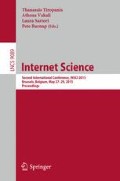Abstract
The increasing use of digital technologies for research purposes is affecting scholarly communication. This analysis of a nationwide survey with academics in Germany shows that, in the process of collaborative writing, co-authors communicate across multiple channels. Communication forms based on digital technologies are used complementarily to face-to-face communication. Furthermore, it is evident from the data that the more digital technologies researchers use, the more face-to-face meetings they hold.
Access this chapter
Tax calculation will be finalised at checkout
Purchases are for personal use only
Preview
Unable to display preview. Download preview PDF.
References
Bozeman, B., Boardman, C.: Research Collaboration and Team Science. A State-of-the-Art Review and Agenda. Springer, Heidelberg (2014)
Katz, J.S., Martin, B.R.: What is research collaboration? Research Policy 26, 1–18 (1997)
Wuchty, S., Jones, B.F., Uzzi, B.: The Increasing Dominance of Teams in Production of Knowledge. Report. Science 316(5827), 1036–1039 (2007), doi:10.1126/science.1136099.
Science 2.0 Survey 2013 Datareport. Pscheida, D., Albrecht, S., Herbst, S., Minet, C., Köhler, T.: Nutzung von Social Media und onlinebasierten Anwendungen in der Wissenschaft. Erste Ergebnisse des Science 2.0-Survey 2013 des Leibniz-Forschungsverbunds Science 2.0 (2013), http://nbn-resolving.de/urn:nbn:de:bsz:14-qucosa-132962
Science 2.0 Survey 2014 Datareport. Pscheida, D., Minet, C., Herbst, S., Albrecht, S., Köhler, T.: Nutzung von Social Media und onlinebasierten Anwendungen in der Wissenschaft – Ergebnisse des Science 2.0-Survey 2014 (2015), http://d-nb.info/1069096679/34
Borgman, C.L.: Scholarship in the Digital Age. Information, Infrastructure, and the Internet. MIT Press, Cambridge (2007)
Weller, M.: The Digital Scholar. How Technology Is Transforming Scholarly Practice. Bloomsbury Publishing (2011)
Nentwich, M., König, R.: Cyberscience 2.0. Research in the Age of Digital Social Networks. Campus, Frankfurt-on-Main (2012)
Meyer, E.T., Schroeder, R.: Knowledge Machines. Digital Transformations of the Sciences and Humanities. MIT Press, Cambridge (2015)
Floridi, L.: Hyperhistory and the Philosophy of Information Policies. Philosophy & Technology 25(2), 129–131 (2012), doi:10.1007/s13347-012-0077-4
Floridi, L.: The 4th Revolution. How the Infosphere is Reshaping Human Reality. Oxford University Press, Oxford (2014)
Walther, J.B.: Computer-Mediated Communication: Impersonal, Interpresonal, and Hyperpersonal Interaction. Communication Research 23, 3–43 (1996)
Borgman, C.L.: Scholarship in the Digital Age. Information, Infrastructure, and the Internet, p. 65. MIT Press, Cambridge (2007)
Procter, R., Williams, R., Stewart, J., Poschen, M., Snee, H., Voss, A., Asgari–Targhi, M.: Adoption and use of Web 2.0 in scholarly communications. Philosophical Transactions of the Royal Society 368(1926), 4039–4056 (2010)
Scheliga, K.: Open Science Interview with Carolina Ödman-Govender. Zenodo (2014), https://zenodo.org/record/12342?ln=en#.VOsmwvlfaSp
Author information
Authors and Affiliations
Corresponding author
Editor information
Editors and Affiliations
Rights and permissions
Copyright information
© 2015 Springer International Publishing Switzerland
About this paper
Cite this paper
Scheliga, K. (2015). Communication Forms and Digital Technologies in the Process of Collaborative Writing. In: Tiropanis, T., Vakali, A., Sartori, L., Burnap, P. (eds) Internet Science. INSCI 2015. Lecture Notes in Computer Science(), vol 9089. Springer, Cham. https://doi.org/10.1007/978-3-319-18609-2_9
Download citation
DOI: https://doi.org/10.1007/978-3-319-18609-2_9
Publisher Name: Springer, Cham
Print ISBN: 978-3-319-18608-5
Online ISBN: 978-3-319-18609-2
eBook Packages: Computer ScienceComputer Science (R0)

